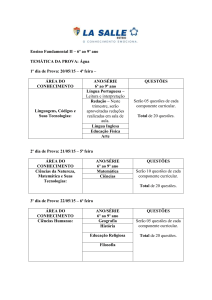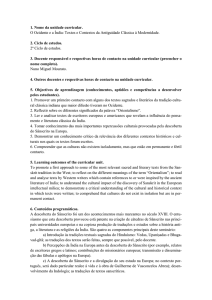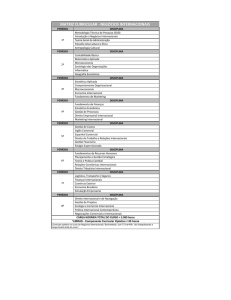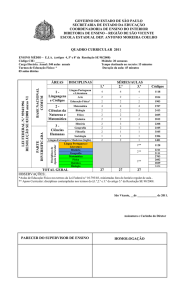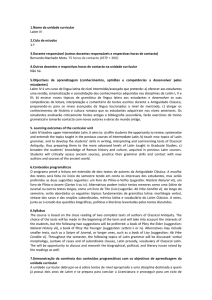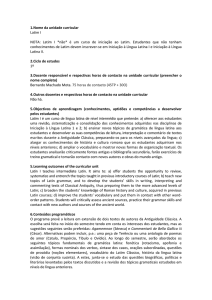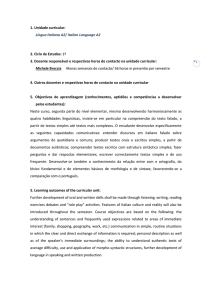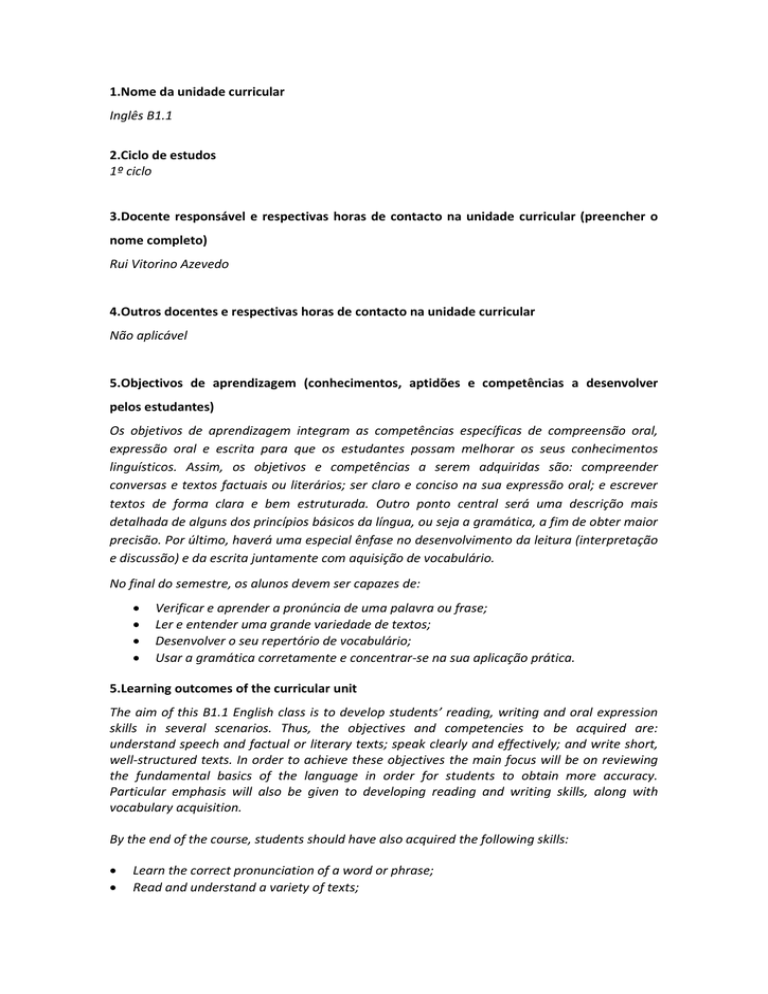
1.Nome da unidade curricular
Inglês B1.1
2.Ciclo de estudos
1º ciclo
3.Docente responsável e respectivas horas de contacto na unidade curricular (preencher o
nome completo)
Rui Vitorino Azevedo
4.Outros docentes e respectivas horas de contacto na unidade curricular
Não aplicável
5.Objectivos de aprendizagem (conhecimentos, aptidões e competências a desenvolver
pelos estudantes)
Os objetivos de aprendizagem integram as competências específicas de compreensão oral,
expressão oral e escrita para que os estudantes possam melhorar os seus conhecimentos
linguísticos. Assim, os objetivos e competências a serem adquiridas são: compreender
conversas e textos factuais ou literários; ser claro e conciso na sua expressão oral; e escrever
textos de forma clara e bem estruturada. Outro ponto central será uma descrição mais
detalhada de alguns dos princípios básicos da língua, ou seja a gramática, a fim de obter maior
precisão. Por último, haverá uma especial ênfase no desenvolvimento da leitura (interpretação
e discussão) e da escrita juntamente com aquisição de vocabulário.
No final do semestre, os alunos devem ser capazes de:
Verificar e aprender a pronúncia de uma palavra ou frase;
Ler e entender uma grande variedade de textos;
Desenvolver o seu repertório de vocabulário;
Usar a gramática corretamente e concentrar-se na sua aplicação prática.
5.Learning outcomes of the curricular unit
The aim of this B1.1 English class is to develop students’ reading, writing and oral expression
skills in several scenarios. Thus, the objectives and competencies to be acquired are:
understand speech and factual or literary texts; speak clearly and effectively; and write short,
well-structured texts. In order to achieve these objectives the main focus will be on reviewing
the fundamental basics of the language in order for students to obtain more accuracy.
Particular emphasis will also be given to developing reading and writing skills, along with
vocabulary acquisition.
By the end of the course, students should have also acquired the following skills:
Learn the correct pronunciation of a word or phrase;
Read and understand a variety of texts;
Understand the context of vocabulary;
Use grammar correctly and concentrate on its practical application.
6.Conteúdos programáticos
As aulas serão baseadas na leitura e discussão de vários contos de autores americanos
contemporâneos, incluindo: Shobha Rao, Justin Bigos, Laura Lee Smith, Megan Mayhew
Bergman, T.C. Boyle, entre outros. A revisão gramatical centrar-se-á no seguinte: tempos
verbais (presente, passado e futuro), comparações, condicionais, discurso indireto, orações
relativas, adjetivos e advérbios, verbos modais e a voz passiva. Os estudantes terão que fazer
várias apresentações e haverá também vários trabalhos escritos.
6.Syllabus
Classes will be based on the reading and discussion of several short stories by contemporary
American authors, including: Shobha Rao, Justin Bigos, Laura Lee Smith, Megan Mayhew
Bergman, T.C. Boyle, among others. The grammar revision will focus mainly on: present, past
and future forms, comparisons, conditionals, reported speech, relative clauses, adjectives and
adverbs, modals, and passive forms. Students will be asked to make several mini-presentations
and do several short writing assignments.
7.Demonstração da coerência dos conteúdos programáticos com os objectivos de
aprendizagem da unidade curricular
A aprendizagem de uma língua engloba sempre o seu uso eficaz. O objetivo deste programa é,
portanto, integrar as competências específicas de compreensão, expressão oral e escrita de
modo a oferecer aos alunos a possibilidade de praticarem o seu inglês em vários cenários.
7.Demonstration of the syllabus coherence with the curricular unit's objectives
The learning of a language always encompasses its effective use. The objective of this syllabus
is therefore to integrate the specific skills of comprehension, speaking and writing in order to
provide students with the possibility of practicing their English in several scenarios.
8.Metodologias de ensino (avaliação incluída)
A metodologia de ensino é a abordagem comunicativa. As notas são determinadas
essencialmente pela classificação de uma prova escrita (midterm), várias apresentações orais e
um projeto de escrita criativa contando cada um 25% para a nota final. Outros 25% serão
atribuídos a vários trabalhos escritos e trabalhos de casa ao longo do semestre juntamente
com a participação ativa nas discussões das aulas e na assiduidade.
8.Teaching methodologies (including evaluation)
The teaching methodology is the communicative approach because the learning of a language
always encompasses its effective use. Grades are determined primarily by student performance
on one written test (midterm), several short oral presentations, and a creative writing project,
each of which will count 25% towards the final grade. The remaining 25% will include
written/homework assignments throughout the semester along with active participation in
class discussion and attendance.
9.Demonstração da coerência das metodologias de ensino com os objectivos de
aprendizagem da unidade curricular
Uma língua deve ser praticada e é por isso que a metodologia é a abordagem comunicativa. Os
alunos têm a oportunidade permanente de se expressarem sobre os vários tópicos discutidos
para melhorar as suas competências na língua. Através de uma série de tópicos, somos capazes
de rever os aspetos fundamentais da língua que se encontram em conformidade com os
objetivos da disciplina.
9.Demonstration of the coherence between the teaching methodologies and the learning
outcomes
A language needs to be practiced and that is why the methodology is the communicative
approach. Students are continuously given the opportunity to express themselves on the
several topics discussed in order to improve their skills in the language. Through a series of vast
topics, we are capable of reviewing the fundamental aspects of the language that are in accord
with the course objectives and learning outcomes.
10.Bibliografia
Boyle, T. C. (ed.) The Best American Short Stories 2015. New York: Mariner Books, 2015.
Hacker, Diana, Nancy I. Sommers, Rick A. Matthews and Marcy Carbajal Van Horn. A Pocket
Style Manual. 6th ed. Boston: Bedford/St. Martin's, 2013.
Hitchcock, Bert, Virginia M. Kouidis and Eugene Current-García. American Short Stories. 8th ed.
New York: Pearson Longman, 2008.
Lester, Mar. Practice Makes Perfect: Advanced ESL Grammar. 1st ed. Chicago, IL: McGraw-Hill,
2010.
Moser, Robert Henry and Antonio Luciano de Andrade Tosta. Luso-American Literature:
Writings by Portuguese-Speaking Authors in North America Multi-Ethnic Literatures of
the Americas. New Brunswick, N.J.: Rutgers University Press, 2011.

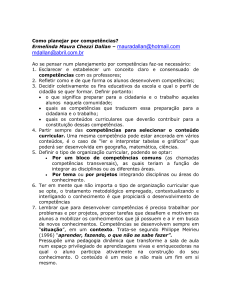
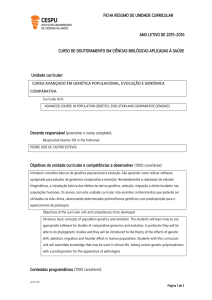
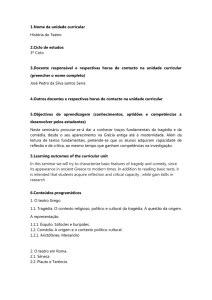
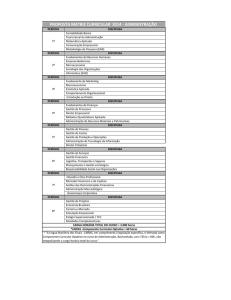
![Seminário [História Antiga]](http://s1.studylibpt.com/store/data/001254899_1-5f51363e7ff1a9132562b4d14bd1112c-300x300.png)
